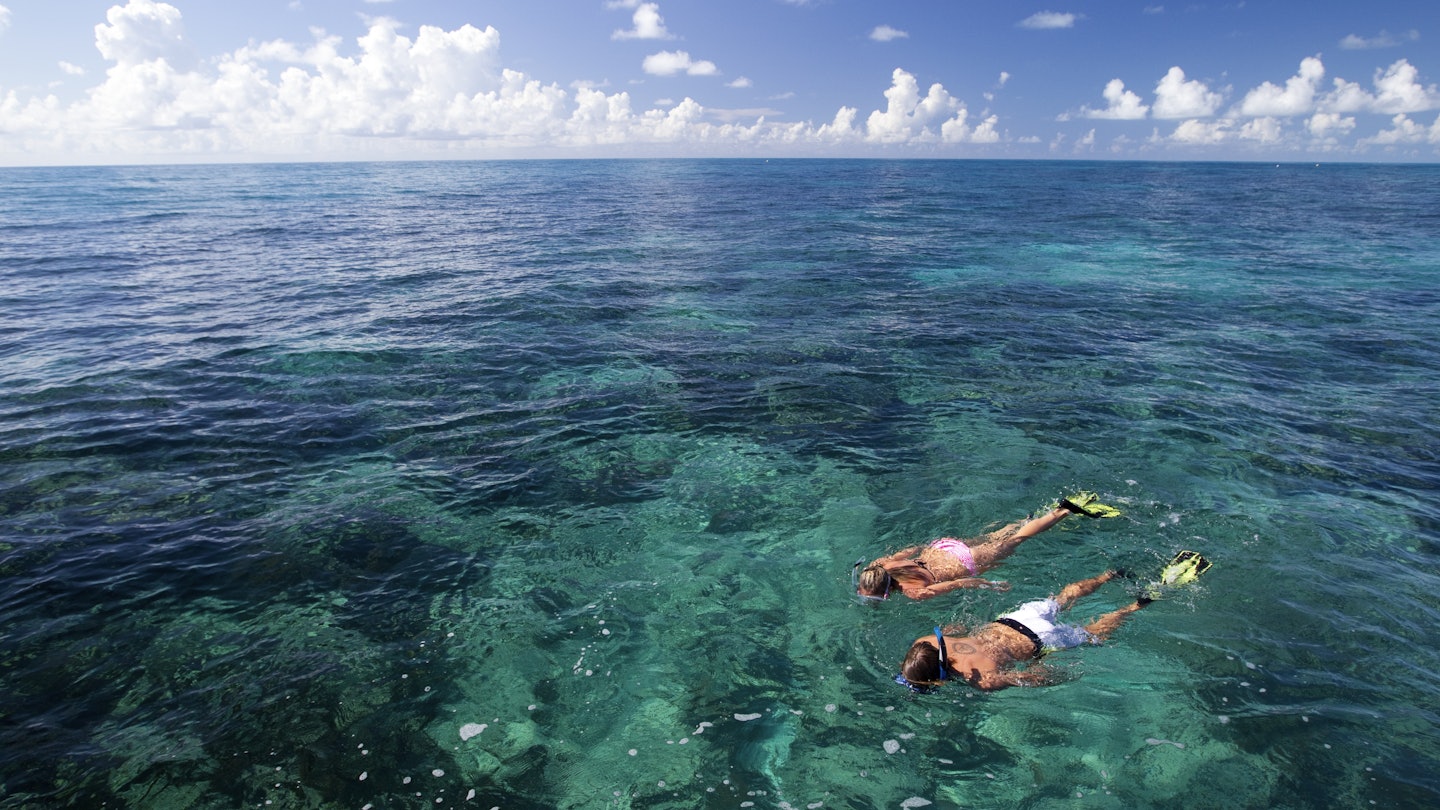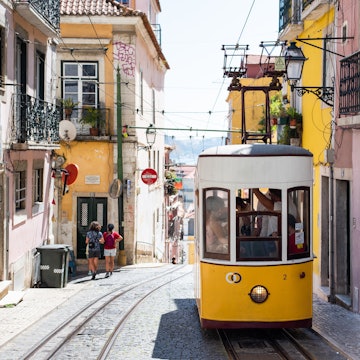

Floating over a coral garden in Florida Keys National Marine Sanctuary © Stephen Frink / Getty Images
Look at a map of the US and you'll see the islands of the Florida Keys dangling down from the southern tip of Florida in a 113-mile-long chain. At a glance, figuring out the best ways of getting around Key West and the rest of the Florida Keys might seem complicated, but in reality, traveling across the archipelago is surprisingly straightforward.
In fact, it can be easier to travel here than in a lot of other places in the US, and that’s because this is an island chain, not in spite of it. One long road connects the main islands of the Keys to the rest of Florida – unless you have a boat or a plane or are a very keen swimmer, that’s how you get from tropical island A to tropical island B.
It may help to note that the Keys are divided into three zones. Running from the mainland to Key West, these zones are:
the Upper Keys (Key Largo to Long Key Bridge)
the Middle Keys (Conch Key to the Seven-Mile Bridge)
the Lower Keys (everything else, including Key West)
Here are the six best ways to get around the Florida Keys.
1. The Overseas Highway
The 113-mile long Overseas Highway is the southernmost portion of US Route 1, the great north-south highway running all the way from Fort Kent in Maine to Key West in Florida (that’s a distance of 2370 miles for any trivia lovers out there). As it winds its way across the Keys, the Overseas Highway crosses 42 bridges, including the huge Seven Mile Bridge, joining Marathon and Big Pine Key. These bridges add artificial elevation to a road that otherwise traverses a completely flat landscape, offering occasional glimpses across the archipelago.
In light traffic, it takes a little over 2 hours to drive from Key Largo, the northernmost Key, to Key West, the southernmost city in the contiguous United States. But at weekends and during festivals and busy holiday periods, tourists stream into or out of the Keys, and the Overseas Highway can get pretty choked. The width of the road is limited by the width of these skinny islands, and when the highway is congested, travel times can be doubled, or more.
Distances on the Overseas Highway are designated by mile markers, usually abbreviated to MM in addresses. The markers start at MM 113 in Key Largo and tick down to MM 0 in Key West. If a business lists itself with a decimal point – say, "MM 70.5" – that means it lies halfway between MM 70 and MM 71. You may also see the side of the highway indicated in addresses: "Oceanside" means towards the Atlantic Ocean, while "Bayside" or "Gulfside" (used in the Upper Keys, and Middle and Lower Keys respectively) means towards the Gulf of Mexico.
The best way to experience the Overseas Highway is to take your time. Stop by Robbie’s Marina in Islamorada to feed the tarpon and browse the open-air market. The colorful beer garden at Florida Keys Brewing Company is a great place to enjoy lawn games and live music while taking a break from the car. On your way through Marathon, grab a bite at Burdines, an inviting waterfront spot with some of the best fries and hush puppies in the Keys. While making your way through Big Pine Key, keep an eye out for the petite key deer that roam the island.

2. Boat
Locals often use their own boats for inter-island travel, but for tourists, water travel is more useful for getting to the Keys than getting around them. The Key West Express catamaran makes the approximately 3.5-hour trip from Fort Myers Beach, on the mainland, to Key West every day throughout the year, and travels from Marco Island (just south of Fort Myers Beach) seasonally.
An adult one-way/roundtrip ticket costs $130/185 from either departure point, and there’s a bar and food counter on board for refreshments. If you want to experience a world-class paddling adventure, contact Burnham Guides and enquire about their 200-mile custom kayaking trip from Everglades City, through the waterways of the Ten Thousand Islands, across Florida Bay to Key West.
3. Air
Air travelers to the Keys fly into Key West International Airport, located off S Roosevelt Blvd on the east side of Key West island. It's linked to major hubs across Florida and the rest of the country. Miami International Airport offers direct flights that take just over an hour. Ground transportation from the airport to Key West's Old Town will cost $9-22, depending on whether you take a shuttle or a metered taxi.

4. Bicycle
You can, with some grit and creativity, cycle the length of the archipelago via the Florida Keys Overseas Heritage Trail. In some places, it's an exceptionally scenic ride, but sections of the trail either cross the main road or share a shoulder with the busiest parts of the highway, which can be pretty jarring. If you’re looking for a scenic ride without taking on the entire trek, the Grassy Key Trail is a paved 4.4-mile section that runs through Curry Hammock State Park. Within the islands, Key West and its historical Old Town district, with its narrow streets and pretty houses, is by far the loveliest area to cycle around. The Key West Cycling Loop is a 10.2-mile trail that circles the perimeter of the island and passes through some of the area’s historic sites and neighborhoods as well as popular landmarks. Skipping the rental car in favor of a bicycle is also a great way to experience Key West on a budget.
5. Bus
Key West Transit operates city routes in Key West, and the Lower Keys Shuttle, linking Key West to Marathon. From Marathon, you can hop on the 301 Dade-Monroe Express Bus, which runs between Marathon and the city of Miami. The trip takes a little over 2 hours. Note that while buses are cheap (tickets run from $2 to $4), these are largely commuting services aimed at locals, so don’t expect a luxe door-to-door service.
If that is what you’re in the market for, consider the Keys Shuttle, a van shuttle that can get travelers from Miami and Fort Lauderdale to Key West and anywhere in-between. Greyhound runs from Miami to Key West; fares vary depending on how far in advance you book but are usually around $30 each way.
6. Trams and trolleys
On the island of Key West, you can both get around and listen to a narrated tour via the retro-cute Old Town Trolley or Conch Tour Train. These tram and trolley tours mainly highlight the iconic attractions the southernmost Florida city is known for: key lime pie, the Hemingway house, Duval Street and Mallory Square. Neither is a really efficient way of getting around, but if you’re traveling with patient kids or want a laid-back introduction to the island, they fit the bill.

Accessible transportation in the Florida Keys
Accessible transportation options are, unsurprisingly, most common in Key West. The Old Town district is the only part of the Keys that can be described as having a sizable pedestrian-friendly area. It's also the only part of the Keys that can comfortably be explored at street level with a wheelchair.
Wheelchairs and mobility scooters can be rented at Four Star Rentals and Island Comfort Mobility, while Pirate Scooters rents golf carts as well as, of course, scooters. Key West Taxis (also known as Five Sixes) has some wheelchair-accessible vehicles, and airport shuttle services can usually accommodate wheelchairs. Even regular, non-lift-equipped taxis in the Keys can fit in foldable wheelchairs.
While many of the bicycle paths in the Keys are wheelchair friendly, they are not all connected, and you may have to cross busy roads. Some of the state parks have wheelchair-accessible trails, particularly Curry Hammock and John Pennekamp; you can rent beach wheelchairs at Bahia Honda.
Ferries to Dry Tortugas National Park are wheelchair-accessible, as are the Greyhound buses that run to Miami. You can also take a wheelchair on some of the Old Town trolleys and Conch Tour Trains; contact the companies ahead of time to make sure you ride the right train.
This segues neatly into the best advice we can give to travelers with disabilities: if you require accessible transportation for getting around Key West, always call ahead to ensure your traveling needs are met. The Keys are small and the services offered by private businesses and attractions can vary significantly from season to season.
You may also like:
Top things to do in the Florida Keys
When to visit the Florida Keys to beat the crowds
First-time Florida Keys: island hopping along the Overseas Highway
Take your United States (USA) trip with Lonely Planet Journeys
Time to book that trip to United States (USA)
Lonely Planet Journeys takes you there with fully customizable trips to top destinations–all crafted by our local experts.
























